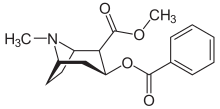കൊക്കെയ്ൻ
രാസസംയുക്തം
കോക്ക് എന്നുകൂടി അറിയപ്പെടുന്ന കൊക്കെയ്ൻ അതിശക്തമായ ഒരു ഉത്തേജക മരുന്നും മനോരഞ്ജനത്തിനായി ഉപയോഗിക്കുന്ന മയക്കുമരുന്നുമാണ്.[11] ഇത് സാധാരണയായി മൂക്കിലൂടെ വലിക്കുകയോ പുകവലിക്കുകയോ അല്ലെങ്കിൽ സിരകളിലേക്ക് നേരിട്ടു കുത്തിവയ്ക്കുകയോ ചെയ്യുന്നു.[10] ഇത് ഉപയോഗിക്കുന്നതിന്റെ പരിണത ഫലങ്ങളിൽ യാഥാർത്ഥ്യവുമായുള്ള സമ്പർക്കം നഷ്ടപ്പെടുക, ഉൽക്കടമായ സ��്തോഷം, മനഃക്ഷോഭം എന്നിവ അനുഭവപ്പെടുക എന്നിവയും ഉൾപ്പെടുന്നു.[12]
 | |
 | |
| Clinical data | |
|---|---|
| Pronunciation | kəʊˈkeɪn |
| Trade names | Neurocaine,[1] other |
| Other names | Benzoylmethylecgonine, coke |
| AHFS/Drugs.com | Micromedex Detailed Consumer Information |
| Dependence liability |
|
| Addiction liability | High[4] |
| Routes of administration | Topical, oral, insufflation, intravenous |
| Drug class | |
| ATC code | |
| Legal status | |
| Legal status |
|
| Pharmacokinetic data | |
| Bioavailability |
|
| Metabolism | liver CYP3A4 |
| Metabolites | Norcocaine, benzoylecgonine, cocaethylene |
| Onset of action | seconds to minutes[10] |
| Elimination half-life | 1 hour |
| Duration of action | 5 to 90 minutes[10] |
| Excretion | Kidney |
| Identifiers | |
| |
| CAS Number | |
| PubChem CID | |
| IUPHAR/BPS | |
| DrugBank | |
| ChemSpider | |
| UNII | |
| KEGG | |
| ChEBI | |
| ChEMBL | |
| PDB ligand | |
| CompTox Dashboard (EPA) | |
| ECHA InfoCard | 100.000.030 |
| Chemical and physical data | |
| Formula | C17H21NO4 |
| Molar mass | 303.353 g/mol |
| 3D model (JSmol) | |
| Melting point | 98 °C (208 °F) |
| Boiling point | 187 °C (369 °F) |
| Solubility in water | ~1.8 mg/mL (20 °C) |
| |
| |
| | |
അവലംബം
തിരുത്തുക- ↑ Nordegren, Thomas (2002). The A-Z Encyclopedia of Alcohol and Drug Abuse (in ഇംഗ്ലീഷ്). Universal-Publishers. p. 461. ISBN 9781581124040.
- ↑ Malenka RC, Nestler EJ, Hyman SE (2009). "Chapter 15: Reinforcement and Addictive Disorders". In Sydor A, Brown RY (eds.). Molecular Neuropharmacology: A Foundation for Clinical Neuroscience (2nd ed.). New York: McGraw-Hill Medical. p. 367. ISBN 978-0-07-148127-4.
While physical dependence and withdrawal occur with some drugs of abuse (opiates, ethanol), these phenomena are not useful in the diagnosis of addiction because they do not occur with other drugs of abuse (cocaine, amphetamine) and can occur with many drugs that are not abused (propranolol, clonidine).
- ↑ Ghodse, Hamid (2010). Ghodse's Drugs and Addictive Behaviour: A Guide to Treatment (4 ed.). Cambridge University Press. p. 91. ISBN 978-1-139-48567-8. Archived from the original on 10 സെപ്റ്റംബർ 2017.
{{cite book}}: Unknown parameter|name-list-format=ignored (|name-list-style=suggested) (help) - ↑ Introduction to Pharmacology Third Edition. Abingdon: CRC Press. 2007. pp. 222–223. ISBN 978-1-4200-4742-4. Archived from the original on 10 സെപ്റ്റംബർ 2017.
- ↑ "DEA / Drug Scheduling". www.dea.gov. Archived from the original on 9 ഓഗസ്റ്റ് 2017. Retrieved 7 ഓഗസ്റ്റ് 2017.
- ↑ 6.0 6.1 Fattinger K, Benowitz NL, Jones RT, Verotta D (July 2000). "Nasal mucosal versus gastrointestinal absorption of nasally administered cocaine". European Journal of Clinical Pharmacology. 56 (4): 305–10. doi:10.1007/s002280000147. PMID 10954344.
- ↑ Barnett G, Hawks R, Resnick R (1981). "Cocaine pharmacokinetics in humans". Journal of Ethnopharmacology. 3 (2–3): 353–66. doi:10.1016/0378-8741(81)90063-5. PMID 7242115.
- ↑ Jeffcoat AR, Perez-Reyes M, Hill JM, Sadler BM, Cook CE (1989). "Cocaine disposition in humans after intravenous injection, nasal insufflation (snorting), or smoking". Drug Metabolism and Disposition. 17 (2): 153–9. PMID 2565204.
- ↑ Wilkinson P, Van Dyke C, Jatlow P, Barash P, Byck R (March 1980). "Intranasal and oral cocaine kinetics". Clinical Pharmacology and Therapeutics. 27 (3): 386–94. doi:10.1038/clpt.1980.52. PMID 7357795.
- ↑ 10.0 10.1 10.2 Zimmerman JL (October 2012). "Cocaine intoxication". Critical Care Clinics. 28 (4): 517–26. doi:10.1016/j.ccc.2012.07.003. PMID 22998988.
- ↑ Pomara C, Cassano T, D'Errico S, Bello S, Romano AD, Riezzo I, Serviddio G (2012). "Data available on the extent of cocaine use and dependence: biochemistry, pharmacologic effects and global burden of disease of cocaine abusers". Current Medicinal Chemistry. 19 (33): 5647–57. doi:10.2174/092986712803988811. PMID 22856655.
- ↑ Zimmerman JL (October 2012). "Cocaine intoxication". Critical Care Clinics. 28 (4): 517–26. doi:10.1016/j.ccc.2012.07.003. PMID 22998988.